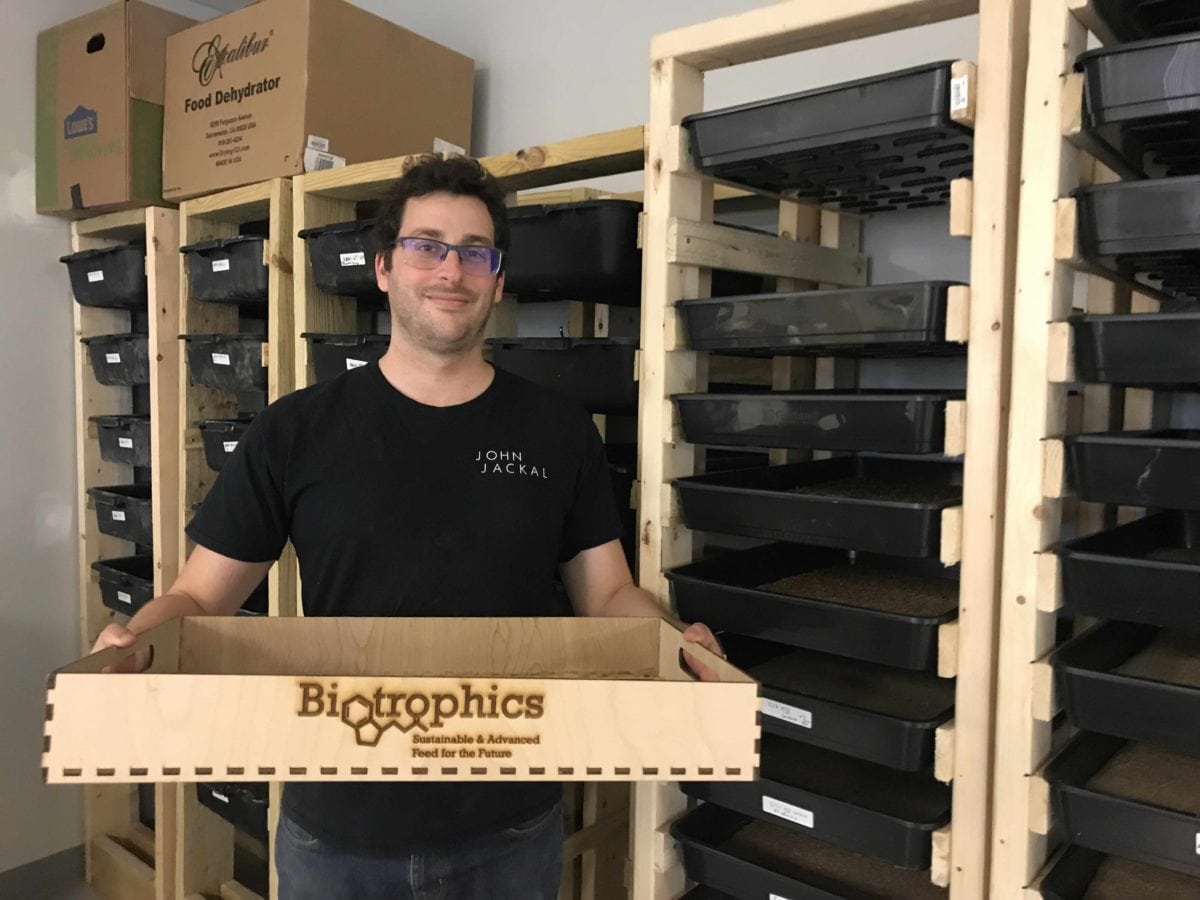In a quiet corner of the Harbor Designs and Manufacturing space inside Southwest Baltimore’s Wicomico building, Sam Glickstein oversees one of Baltimore’s newest farms.
In rows of bins stacked vertically on shelves, Glickstein is growing mealworms and collecting data. It’s the early work of Biotrophics, a startup Glickstein founded last year.
While some farms raise animals, this particular farm grows insects. By tinkering with variables such as diets and the growing environment, the company is working to engineer insects to provide a sustainable building block for a variety of industries.
A graduate of Goucher College, Glickstein got started working in agriculture through hydroponic farming in Texas, but he returned to Maryland in 2016. Seeking to start his own venture, he shifted focus to recirculating aquaculture, which is a system to grow fish. But he soon found that the growing cost of fishmeal presented the need for an alternative, as well as a more sustainable source than feeding fish with fish. He soon identified insects as an alternative that could be grown for feed.
“This was an extremely new potential market and had a lot of potential to be its own business,” he said.
Along with the cricket and the housefly, mealworms are already among the “sustainable proteins” being grown for animal feed – and even getting a tryout as an additive for human food – as the food industry begins to test out the more sustainable protein source despite the backdrop of a culture that’s historically bug-averse.
By growing mealworms, Glickstein said he could apply some of the same techniques he learned in hydroponic farming.
Recently, Biotrophics received a grant from the Maryland Industrial Partnerships program. It will provide $100,000 in funding. As MIPS grants include a collaboration with a faculty member from the University System of Maryland, Glickstein is partnering with Institute of Marine and Environmental Technology Professor Allen Place to study the biocomposition of the mealworms as they are fed different diets.
Biotrophics also recently began the F3 Tech Accelerator program, which provides resources for Maryland companies working in farm, fish and food.
Glickstein believes the mealworm can be grown to provide a more nutritious feed, and sees promise for commercial production.
But with the focus on creating a strain of mealworm that’s efficient to grow and nutritious for feed, the strain of mealworm itself has potential interest even without a massive farming operation. In this biotech-oriented focus, he also sees a model that doesn’t intend to limit the startup to one kind of insect – or bringing the bugs to only the food industry.
“I realized the answer to what Biotrophics was attempting to do was to treat insects like the newest form of livestock, which they are,” Glickstein said.
Technical.ly’s Editorial Calendar explores a different topic each month. The September 2018 topic is Sciences. These stories explore scientific innovations and research in each of Technical.ly’s markets.
Before you go...
Please consider supporting Technical.ly to keep our independent journalism strong. Unlike most business-focused media outlets, we don’t have a paywall. Instead, we count on your personal and organizational support.
3 ways to support our work:- Contribute to the Journalism Fund. Charitable giving ensures our information remains free and accessible for residents to discover workforce programs and entrepreneurship pathways. This includes philanthropic grants and individual tax-deductible donations from readers like you.
- Use our Preferred Partners. Our directory of vetted providers offers high-quality recommendations for services our readers need, and each referral supports our journalism.
- Use our services. If you need entrepreneurs and tech leaders to buy your services, are seeking technologists to hire or want more professionals to know about your ecosystem, Technical.ly has the biggest and most engaged audience in the mid-Atlantic. We help companies tell their stories and answer big questions to meet and serve our community.
Join our growing Slack community
Join 5,000 tech professionals and entrepreneurs in our community Slack today!

The person charged in the UnitedHealthcare CEO shooting had a ton of tech connections

The looming TikTok ban doesn’t strike financial fear into the hearts of creators — it’s community they’re worried about

Where are the country’s most vibrant tech and startup communities?




